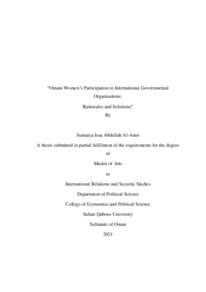Document
Omani women`s participation in international governmental organizations : rationales and solutions.
Publisher
Sultan Qaboos University.
Gregorian
2021
Language
English
English abstract
The progress and urbanization of societies can be measured in part by the extent of
women's participation in political life, which is considered a main pillar in this
development process (Alsop, 2005). Omani women have received government support to
empower them in all areas of life since the renaissance in 1970 under the leadership of
His Majesty Sultan Qaboos bin Said (may God have mercy on him), and their position
has become prominent in Omani society, bringing them equality with men. Despite this,
the paper will show a severe low of Omani women's participation in international
Governmental Organisations (IGOs). According to the UN Women Report (2017), the
percentage of women working in the United Nations reached 42.8% by the end of 2017.
The number of Omani women working in the United Nations without a scholarship at the
time of this research was only three women (S. Al-Habsi, Personal Communications, Oct
9, 2020). There are limited statistics on the number of Omani women who work in these
organisations in either government appointments or a personal capacity. The main
objective of this study was to explore the reasons behind the nonparticipation of Omani
women in international Governmental Organisations. Data was collected by following
mixed methods to achieve reliability in answering the research questions. This study
collected numbers, statistics, and crucial information on the extent of the presence of
women in these organisations in general and Omani women in particular. All of the data
required to achieve the purpose of the study were collected from primary and secondary
resources. The first method in collecting data were semi-structured interviews with openended questions to give respondents freedom to present their thoughts on the reasons
behind this serious low of participation of Omani women in such organisations. In
addition, a questionnaire was given in Arabic to a group of women working in the
government sector in various fields. In addition, a questionnaire was given in English to
a segment of 130 employees working in the political field. Secondary data came from
books, magazines, official websites, official reports, newspapers, and scholarly journals.
The collection of primary data—the basic information answering the main question of
this study—aimed to explore the rationale behind the low participation of Omani women
P a g e
Member of
Resource URL
Arabic abstract
اللازمة عن مدى تواجد النساء في هذه المنظمات بشكل عام والنساء العمانيات بشكل خاص. حيث سيتم جمع جميع البيانات المطلوبة التي يمكن أن تحقق الغرض من الدراسة من الموارد الأولية والثانوية. ستكون المصادر الأولية للبيانات هي المقابلات شبة المنظمة مع أسئلة مفتوحه من أجل إعطاء العيمة تحت الدراسة مطلق الحرية لعرض الأسباب الكامنة خلف هذا النقص الجاد في مشاركة النساء العمانيات في مثل هذه المنظمات بالإضافة الى استبيان باللغتين اللغة العربية ولعرضه على شريحة نسائية تعمل بالقطاع الحكومي في شتى المجالات وباللغة الإنجليزية وذلك لعرضة على شريحة مكونه من 130 موظف و موظفه عاملين في المجال السياسي. البيانات الثانوية هي الكتب والمجلات والمواقع الرسمية والتقارير الرسمية والصحف والمجلات العلمية الأخرى. جمع البيانات الأولية المعلومات الأساسية التي تجيب على السؤال الرئيسي لهذه الدراسة ، والتي تهدف إلى استكشاف الأساس المنطقي وراء غياب المرأة العمانية عن العمل السياسي الدولي. علاوة على ذلك ، سوف تستكشف الدراسة الأسباب الكامنة وراء عدم رغبة المرأة العمانية في العمل في المنظمات السياسية خارج السلطنة ، والتي ستغطي الأسباب الرسمية وغير الرسمية وراء هذا النقص. شخصياً ، ستكون النتائج صادمة ، حيث أن السبب الرئيسي لعدم وصول المرأة العمانية إلى مستوى عالٍ في المشاركة السياسية في هذه المنظمات مرتبط باسباب غير رسمية والتي تتداخل مع رغبة الحكومة في تمكين المرأة العمانية سياسيا. والنتائج وافقت على فرضيات البحث ، التي جادلت بأن المرأة العمانية تواجه عقبات غير رسمية تساهم في إبعادها عن العمل السياسي الدولي عن طريق التأثير الغير مباشر في التوجه الحكومي. سيتم تحديد ذلك من خلال المقابلات والاستطلاع. يعد تحليل المقابلات والاستبيانات والتقارير الصادرة عن المركز الوطني للإحصاء والأمم المتحدة وهيئة الأمم المتحدة للمرأة والوكالة الدولية للطاقة الذرية والمتعلقة بهذه الدراسة جزءًا من المنهجية المستخدمة للإجابة على أسئلة البحث
Category
Theses and Dissertations

